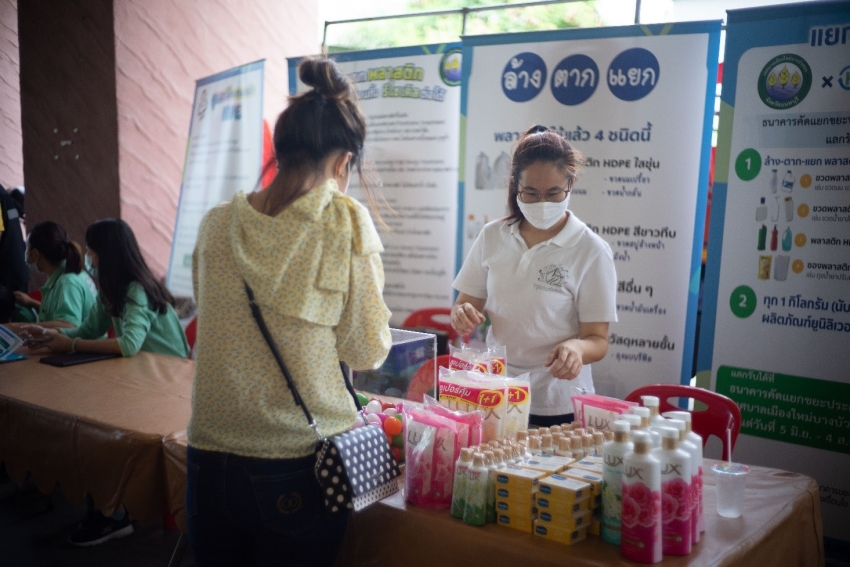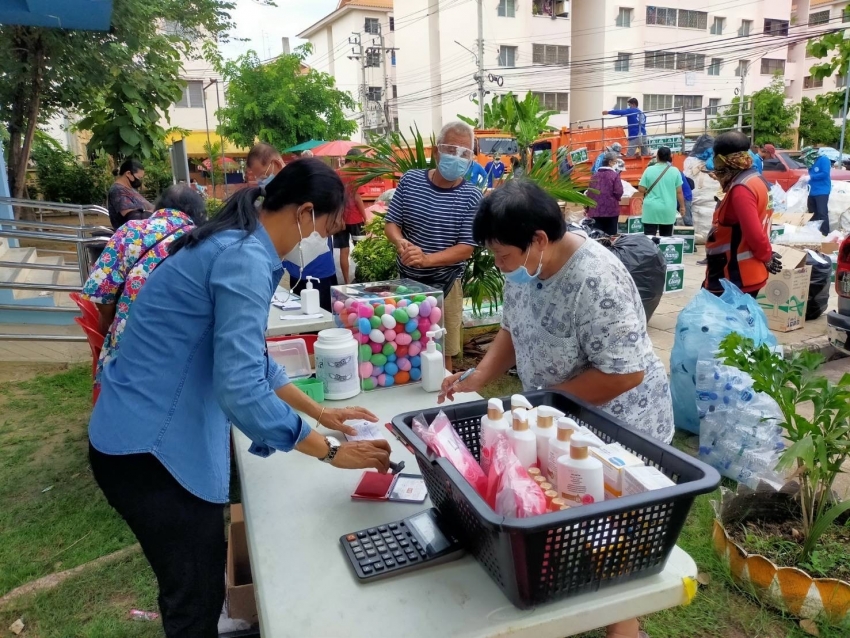Nattinee Netraumpai, Senior Manager of Corporate Affairs of Unilever Thailand, said "I believe that plastic has its place and that it is not in the alleyways, roads, canals, rivers, or streams. As a result, Unilever has pledged to make all of our packaging 100 percent recyclable, reusable, or compostable by 2025. We have halved our use of virgin plastic by half, or about 100,000 tons worldwide. We are collecting post-consumer plastic packaging than we sell. These efforts aim to keep plastic circulating in the economy and prevent plastic from escaping into the environment by 2025. The success of the project Sorting for the Better (Yak Dee Mee Tae Dai) is only possible through strong collaboration among key players in the circular economy network, including manufacturers, recyclers, plastic packaging processors, municipalities, and communities, of which none can be overlooked. This, however, is just the beginning. Our planet's protection must come from our collective efforts to convert post-consumer plastic into an endless supply of renewable resources."
Krisada Ruangchotevit, Head of ESG office of SCG Chemicals Public Company Limited or SCGC, said, "SCGC places emphasis on conducting business based on the circular economy, which contributes to the achievement of sustainability goals and compliance with ESG (Environmental, Social, and Governance) standards. In addition to implementing the principles of circular economy to develop plastic innovation for the environment, another component at the heart of this is comprehensive management of post-consumer plastic, which includes waste sorting at the source, environmental awareness, waste separation education, and most significantly, motivation to drive behavioral changes and demonstrate exemplary actions. Regarding the project "Sorting for the Better (Yak Dee Mee Tae Dai)" at the waste bank in Mueang Mai's Bang Bua Thong Municipality, tangible results have been observed over the past year, demonstrating that waste is no longer a waste if it is properly sorted by the community and managed with a comprehensive approach; rather, it becomes a source of extra income. It can also help to mitigate climate change. It is a model that can be used to extract lessons that can be put into practice in other communities."
Vichien Charoennonthasit, Mayor of Mueang Mai Bang Bua Thong Municipality, said "I am delighted and honored to be a part of the KoomKah × Unilever: Sorting for the Better (Yak Dee Mee Tae Dai) project, where we are working with Unilever and SCGC to act as a pilot community for people in the neighborhood to sort two types of post-consumer plastic: HDPE and multilayer packaging. This is a great activity for both the community and the environment. It's a way of imparting accurate information and comprehension and instilling a good attitude toward waste sorting as a means of environmental protection. And I am pleased to keep working on this. If there is anything that Mueang Mai Bang Bua Thong Municipality can do, we will gladly do it to the best of our abilities. This is to increase community awareness and participation in caring for natural resources and the environment to be sustainable and set an example for other communities."
The success of this project is just the first step, and we will not stop here. We also plan to keep expanding the project to include new municipalities or communities. We will continue to establish a circular economy, which will include motivation and understanding of global warming and plastic challenges, both of which are urgent and not individual responsibility. It can only be done through the collaboration of everyone and all sectors. And we hope that this will serve as an example for entrepreneurs, manufacturers, and recyclers, as well as the government, to step up and address this issue more seriously, concluded Nattinee.
About Unilever
Unilever is one of the world’s leading suppliers of Beauty & Personal Care, Home Care, and Foods & Refreshment products, with sales in over 190 countries and products used by 3.4 billion people every day. We have 148,000 employees and generated sales of €52.4 billion in 2021. Over half of our footprint is in developing and emerging markets. We have around 400 brands found in homes all over the world – including iconic global brands like Breeze, Sunsilk, Knorr, Dove, Sunlight, Vaseline, OMO, Wall's, Lux, Citra, Close Up, Comfort, TRESemmé, Clear, Axe, Rexona, Pond's, and other brands such as Lifebuoy, Love Beauty & Planet, Seventh Generation, Hellmann's, and Surf.
Our vision is to be the global leader in sustainable business and to demonstrate how our purpose-led, future-fit business model drives superior performance. We have a long tradition of being a progressive, responsible business. It goes back to the days of our founder William Lever, who launched the world’s first purposeful brand, Sunlight Soap, more than 100 years ago, and it’s at the heart of how we run our company today.
The Unilever Compass, our sustainable business strategy, is set out to help us deliver superior performance and drive sustainable and responsible growth, while:
- improving the health of the planet;
- improving people's health, confidence and wellbeing; and
- contributing to a fairer and more socially inclusive world.
While there is still more to do, in the past year we’re proud to have achieved sector leadership in S&P’s Dow Jones Sustainability Index, ‘Triple A’ status in CDP’s Climate, Water and Forest benchmarks and to be named as the top ranked company in the Global Corporate Sustainability Leaders survey, for the eleventh consecutive year.
For more information about Unilever and our brands, please visit www.unileverme.com
For more information about Unilever Sustainable Living Plan (USLP), please visit https://www.unilever.co.th/planet-and-society/
For more information, please contact Unilever Thailand Corporate Communications Department Email: Press.Thailand@unilever.com
About SCG Chemicals or SCGC
SCG Chemicals or SCGC is the leader in integrated petrochemical company in ASEAN, including Vietnam, Indonesia, and Thailand. It strives to create chemicals innovation to drive the economy in ASEAN and improve people's quality of life based on the ESG approach and circular economy principles. SCGC prioritizes the development of High Value-Added (HVA) products and services in the areas of infrastructure, packaging, consumer goods, automotive, medical and wellness, and energy solutions.
For more information, please visit www.scgchemicals.com






